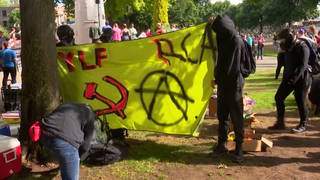
Topics
By Amy Goodman
Clarence Kailin is 92 years old. He recently traveled to New York City to attend the annual reunion of the Veterans of the Abraham Lincoln Brigade. The brigade was originally made up of roughly 3,000 U.S. citizens who volunteered to fight in the Spanish Civil War, which raged from 1936 to 1939.
Seventy years later, Kailin recalled his reasons for leaving the comfort of Madison, Wis., to volunteer to fight in defense of Spain’s democratically elected government against a military coup led by Gen. Francisco Franco, backed by Adolf Hitler and Italian dictator Benito Mussolini: “It was fighting against Italian fascism and German Nazism. And we felt that if we lost the war, that World War II was pretty much inevitable, which is what happened. It happened because Britain and France and the United States refused to give us any help at all. And so, we fought barehanded at times.”
Moe Fishman, a spry 91-year-old Lincoln Brigade veteran, seconds Kailin’s point about the U.S.: “If they had turned to fighting fascism, Hitler would not have attempted a two-front war. There would not have been World War II, where fascism almost won, and 60 million dead, with destruction beyond compare. And, no, there would have been no Holocaust if Hitler had been stopped in Spain in 1936-39.”
The Spanish Civil War is little taught in the U.S. You might know of it from Pablo Picasso’s famous antiwar painting, “Guernica.” Hundreds from around the world gathered in that Basque city on April 26, 2007, for the 70th anniversary of the German bombing there, one of the first aerial bombardments of civilians. The painting has resonance today. A tapestry of the painting that hangs in the U.N. was shrouded in 2003, just before then-Secretary of State Colin Powell gave his famous push for war, so that the antiwar image would not form the backdrop to U.S. press statements.
Or you might learn of the Spanish Civil War by reading George Orwell’s “Homage to Catalonia” or Ernest Hemingway’s “For Whom the Bell Tolls.” In our official history, World War II began for the U.S. with the bombing of Pearl Harbor, on Dec. 7, 1941. But Kailin and other veterans of the Spanish Civil War are living messengers of a different, authentic history, of the earlier fight against fascism and how World War II might have been prevented.
When the veterans returned home, the U.S. government considered them communist sympathizers. Some were prevented from serving in World War II. The FBI actually labeled them “premature antifascists” (I am not making this up).
Among the 3,000 volunteers were 80 American women. Most of them served in the medical corps. The documentary “Into the Fire: American Women in the Spanish Civil War” features the nurses and brave women writers, like Dorothy Parker of The New Yorker, New York Times writer Virginia Cowles and author Martha Gellhorn. Gellhorn was a close friend of Eleanor Roosevelt, who opposed the U.S. arms embargo against Spain but failed to convince her husband, President Franklin Roosevelt, to end it. Gellhorn said: “I was in Germany in 1936, and could not avoid seeing these headlines about the Red Swine Dogs in Spain. I’d been in Spain, but I knew nothing about what had happened … but all I needed was to read in a German paper that it was the Red Swine Dogs to know whose side I was on—theirs.”
The Spanish people endured fascism until Franco’s death in 1975. They know war. So it is perhaps no surprise that Spain saw some of the largest antiwar protests before the invasion of Iraq, nor is it surprising that when their prime minister allied with Bush/Cheney, they voted him out of office. His replacement, Prime Minister Jose Zapatero, immediately withdrew Spanish troops from Iraq.
In the United States, the surviving Spanish Civil War veterans are still working to pass on what they learned. They gathered at the Museum of the City of New York to celebrate its exhibit “Facing Fascism.” Like Clarence Kailin and Moe Fishman, Brigade veteran Matti Mattson, also in his 90s, preferred to look forward rather than look back. “We have to restore our democratic rights,” he said. “We have to get rid of this illegal war.” Let us learn from our elders.
Amy Goodman is the host of “Democracy Now!,” a daily international TV/radio news hour airing on 500 stations in North America.
© 2007 Amy Goodman; distributed by King Features Syndicate











